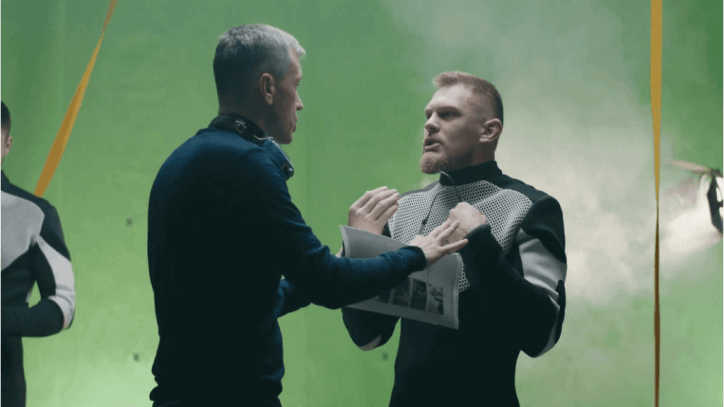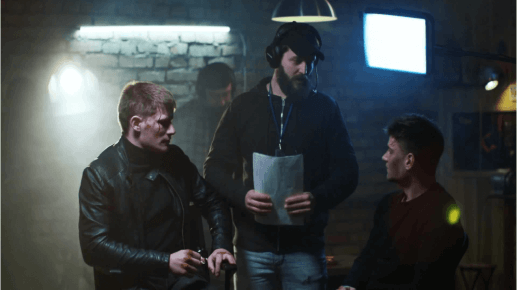Online Film School Free » Film Directing Course » Tips for Directing Actors
Directing Actors Tips



Directing actors is not easy and an art in itself. You need to choreograph every one of them and pay attention to each of them during the scene, and while you’re doing that, you need to remember that their job is making them very vulnerable. That is why many directors don’t like or are afraid of directing actors and want to focus more on the shooting. I hope you don’t feel like it. You may like it or not, but actors are one of the most critical elements of your film, and directing actors is about 50% of directing, so you better learn how to deal with them. I do promise that with practice, you’ll get better at this. Here are 11 directing actors tips you need to remember when directing actors.
If a director can’t understand how he sees the character, he can damage the film’s vision. Actors are the ones that bring life into your characters and to the lines of the script. If the actor is good, every face and movement he’ll do will be full of meanings, just like every shot angle you choose to shoot. To get your actor’s bests, you have to create, as a director, the best atmosphere that works for both of you.
1. Find your actor’s special gift
The first thing you need to do when you start work with an actor (even at the first rehearsal) is to find the unique ingredient that the actor can give to your character. Every good actor gets to bring something else. Some actors can bring authenticity, and some can bring comedy portions. There are many Rehearsal Techniques, and your job is to find the right one for your cast.
Find out what is your actor’s talent and use it.
2. Directing actors with respect
The director and actor have a unique relationship. The director is the watcher, and the actor is the one being watched. That is something that puts the actor in a very vulnerable position. The actor is taking a huge risk by taking the front line of the show. Just for making that big of a chance for your movie, they deserve your respect. A good actor will bring something personal from himself. If the actor is good, he will expose very private parts from himself, making him vulnerable. When you direct them, don’t be too harsh and listen to what you are saying. Try to create a positive atmosphere. For example, instead of saying, “Let’s do it again and this time doesn’t talk so fast,” you can say, “Let’s do it again and this time please try to talk slower.”
Also, try to pay attention to all of the actors in the scene. As directors, we tend to forget the small characters, but they also need care and direction, so watch out for that. As the film director, you need to develop a good working relationship with all your cast. If your actors are first-timers, do some research on them before you meet at the set. Don’t spy on them, and don’t get into too many details, but you can call other directors; they’ve worked and try to learn their approach and style of acting.
I also recommend you to take an acting class. This will help you to understand how actors feel while acting. In his Master Class course, Martin Scorsese advised directors to get in front of the camera. He believes that only when directors expose themselves in front of the camera will they understand the challenges and fears that actors have to face when acting. You will also learn what type of directing can irritate actors.
3. Develop the character’s world together
You need to know your character’s background inside and out before you start casting and writing it down. It will make the actor understand how you see the character. Introduce the actor to the world the character is living in. Think about the kind of movies or music the character likes. Have a paper with everything you know about the role and let the actor add your point, but make sure he stays in the film’s world.
4. Know what your actors need
- First of all, they need a director that knows what he wants. There is nothing more frustrating for an actor than a director who is unsure. As we said, they are in a vulnerable position, and they need you to guide them. They need to know that you won’t quit on them until you get what you need.
- Also, help them “get in the scene.” It’s a good idea to remind them where their characters just came from. Prepare them as much as you can for the scene. Remind them everything they need to know about their character in the specific situation they are acting in now.
- When something doesn’t work for the actor, try to find out what creates the problem. It might be the scene itself, the dialogue, or even the set.
- Show your actors they are essential to you and for the films.
- Respect their time – don’t let them wait on set. Ensure they know when their part of the shooting is and make all efforts to make that time. Making an actor wait onset can hurt their performance.



5. Be clear with your directions
Don’t say stuff like “Do it funnier” or “You need to be scarier” This is very general directing. You have to tell the actors how to act what you want. A good trick is to use metaphors. Let’s say your actor needs to play a guy asking a girl on a date; you can tell him to act as if he is in a job interview. You need to set clear goals and direct the exact actions to these goals. In her MasterClass course, Jodie Foster recommends keeping the direction short.
Do that if you need to have some alone time with them to help them prepare for the scene. Go to a quiet place and set them to the scene’s mood. If the actor is connected to the character’s circumstances and the scene, you will have a good performance.
6. Working with the actor on a scene
As the director, you must know the text well before working on it with the actor. You have to know your viewpoint and listen to his perspective. Often that kind of thing can spark a new idea. The main thing you and your actor need to do is find the character’s motivation for every action she takes. What is she trying to get?
7. Directing actors is also praising them sincerely
Be very clear with your praises and try to use them in each direction you give. I’m trying to say that before you tell them how to fix their acting, tell them what they did right and what you need them to do differently.
8. Be patient
It might take some time to understand what you need and want from many actors. Be patient. You don’t need them to be more stressed than they already are.
9. Working with big-time actors
Many directors get scared when they need to direct famous actors. The truth is that there’s nothing to be afraid of. The more experience the actor is, the easier it will be to direct them. You need to let them do their thing and show them that it is essential to make their performance look good.
10. It’s OK to improvise
I enjoy the rehearsal stage the most. I like to let the actors improvise and see what they can give me each time we work on a scene. If you make your actors improvise, you’ll be surprised at how many actors can give you good ideas you haven’t thought about. Sometimes improvising can also help the actor to really understand their character. One thing that is good to remember when improvising is to let the actors have the freedom to make mistakes. Don’t be too harsh on them if they are doing something completely wrong.
11.Directing actors start with casting
Take the time needed to find the perfect actors for your film. In the article about Audition Actors, we discuss it in more detail, but it’s essential not to take this stage for granted (as many beginning directors tend to do). Do the casting as early as you can in the pre-production stage, so you’ll have enough time to rehearse with them. If you plan on directing non-actors, make sure to cast people that have some knowledge about the character’s life. Find people with the personality that resembles your character.
Directing non-actors
When working on a low budget film, there is a good chance to find yourself working with a non-actor. Sometimes working with non-actors can be an artistic decision for example, when the director wants the film to be authentic. There is no one method to work with non-actors. What’s important to know about working with non-actors because it’s not easy. Here are some tips for working with non-actors
- Don’t be too strict with the script. Let your actors improvise and say the text as they feel right. Don’t make them learn the whole text
- Remember that they are probably very nervous. Make sure you are doing whatever you can to make them feel comfortable from entering the set.
- Try not to have many people on the set while shooting. It can be a real distraction. No one but the director, cinematographer and AC should be on set while shooting the scene.
- Make sure that you or your assistant director are the only ones the gives the non-actors direction.
- If you are under strict deadlines, maybe you should think again about using non-actors, as shooting might take more time with them.
- Think of creative ways to direct your non-actors
- Think about the video editor – When shooting with non-actors, you will need your video editor’s help. Make sure you help the video editor to help you. Shoot from as many camera angles as possible.
These were some general tips for working with actors. I plan to post more articles about directing actors that will go more in-depth, so let me know if something interests you the most. The only exercise I can recommend you do is to ask someone to direct you. Try to be an actor is someone film and see what it’s like. Try to see where he makes you feel bad and when he gives you good directing. I also recommend starting to read a little about acting. You can read books about acting or articles on the subject and interviews.



